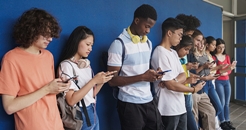 What happens when a school bans cell phones?
What happens when a school bans cell phones?
From an article by the Wall Street Journal
Teachers at the Buxton School, a small school in Massachusetts, were concerned and tired of being gadget police. Students were glued to their phones, looking at phones in the classroom (even though that wasn't allowed), texting instead of talking at lunch time.
When the Covid-19 pandemic hit in 2020 and the school closed for a few months, classes went virtual and things got worse. “We found our students had disengaged more and more from real life as their phones became their world,” says Buxton’s associate head of school. The trend continued after students returned to campus, he says.
School leaders decided to ban smartphones altogether but students can use Light Phones, which have very limited capability - the devices have basic call and text functioning but no internet browser, camera or apps and texting is designed to be clunky, and many students say it’s so slow that they don’t bother texting more than a few words at a time. They can also have smartwatches and laptops. The idea wasn’t to cut off students entirely from the outside world, but to make it harder to have online drama accessible at all times from their pockets.
The initial response was not enthusiastic. “Everyone was crying. Kids were yelling at us,” a school administrator recalls. “Parent feedback was really mixed.” But now, after two months, things have changed. Kids have learned to talk with one another again, instead of texting. Student engagement in class has improved markedly. And the kids themselves appreciate the peace and quiet, the mental calm that comes from not constantly responding to a ping on social media.
The school is surveying students and teachers throughout the year to assess how the smartphone ban is going. In the first instalment, students said the ban hasn’t been as bad as they feared. One student comments, "Not having a phone at school this year has allowed me to make new friends and to savour more moments, I’m a lot happier being on social media less. I think I’ve been a lot more self-aware." Teachers said students are more engaged in class.
“Tech holidays or digital fasts are very effective for restoring baseline mood, motivation, energy and sleep, as well as decreasing the constant cravings to check our devices,” says Anna Lembke, a professor of psychiatry and addiction medicine at Stanford University School of Medicine. The effects can be lasting if people are motivated by the benefits of screen moderation or abstinence, she adds.
Read the full article here (subscribers only)
Retweet about this article:
From an article by the Wall Street Journal, 08/02/2023